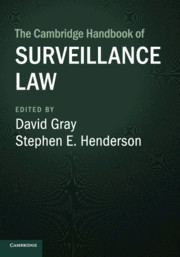The Cambridge Handbook of Surveillance Law Cambridge Law Handbooks Series
Langue : Anglais
Coordonnateurs : Gray David, Henderson Stephen E.

A comprehensive treatment of contemporary surveillance technologies and regulatory strategies with an emphasis on policing and national security.
Surveillance presents a conundrum: how to ensure safety, stability, and efficiency while respecting privacy and individual liberty. From police officers to corporations to intelligence agencies, surveillance law is tasked with striking this difficult and delicate balance. That challenge is compounded by ever-changing technologies and evolving social norms. Following the revelations of Edward Snowden and a host of private-sector controversies, there is intense interest among policymakers, business leaders, attorneys, academics, students, and the public regarding legal, technological, and policy issues relating to surveillance. This Handbook documents and organizes these conversations, bringing together some of the most thoughtful and impactful contributors to contemporary surveillance debates, policies, and practices. Its pages explore surveillance techniques and technologies; their value for law enforcement, national security, and private enterprise; their impacts on citizens and communities; and the many ways societies do - and should - regulate surveillance.
Part I. Surveillance Techniques and Technologies: 1. NSA surveillance in the war on terror Rachel Levinson-Waldman; 2. Location tracking Stephanie K. Pell; 3. Terrorist watchlists Jeffrey Kahn; 4. 'Incidental' foreign intelligence surveillance and the fourth amendment Jennifer Daskal and Stephen I. Vladeck; 5. Biometric surveillance and big data governance Margaret Hu; 6. Fusion centers Thomas Nolan; 7. Big data surveillance: the convergence of big data and law enforcement Andrew Guthrie Ferguson; 8. The internet of things and self-surveillance systems Steven I. Friedland; Part II. Surveillance Applications: 9. Balancing privacy and public safety in the post-Snowden era Jason M. Weinstein and R. Taj Moore; 10. Obama's mixed legacy on cybersecurity, surveillance, and surveillance reform Timothy Edgar; 11. Local law enforcement video surveillance: rules, technology, and legal implications Marc J. Blitz; 12. The surveillance implications of efforts to combat cyber harassment Danielle Keats Citron and Liz Clark Rinehart; 13. The case for surveillance Lawrence Rosenthal; 14. 'Going dark': encryption, privacy, liberty, and security in the 'golden age of surveillance' Geoffrey S. Corn and Dru Brenner-Beck; 15. Business responses to surveillance Lothar Determann; Part II. Impact of Surveillance: 16. Seeing, seizing, and searching like a state: constitutional developments from the seventeenth century to the end of the nineteenth century Mark A. Graber; 17. An eerie feeling of déjà vu: from Soviet snitches to angry birds Alex Kozinski and Mihailis E. Diamantis; 18. The impact of online surveillance on behavior Alex Marthews and Catherine Tucker; 19. Surveillance vs privacy: effects and implications Julie E. Cohen; 20. Intellectual and social freedom Margot E. Kaminski; 21. The surveillance regulation toolkit: thinking beyond probable cause Paul Ohm; 22. European human rights, criminal surveillance, and intelligence surveillance: towards 'good enough' oversight, preferably but not necessarily by judges Gianclaudio Malgieri and Paul De Hert; Part IV. Regulating Surveillance: 23. Lessons from the history of national security surveillance Elizabeth Goitein, Faiza Patel and Fritz Schwarz; 24. Regulating surveillance through litigation: some thoughts from the trenches Mark Rumold; 25. Legislative regulation of government surveillance Christopher Slobogin; 26. California's Electronic Communications Privacy Act (CalECPA): a case study in legislative regulation of surveillance Susan Freiwald; 27. Surveillance in the European Union Cristina Blasi Casagran; 28. Mutual legal assistance in the digital age Andrew Keane Woods; 29. The privacy and civil liberties oversight board David Medine and Esteban Morin; 30. FTC regulation of cybersecurity and surveillance Chris Jay Hoofnagle; 31. The federal communications commission as privacy regulator Travis LeBlanc and Lindsay DeFrancesco.
David Gray teaches criminal law, criminal procedure, evidence, international criminal law, and jurisprudence at the University of Maryland's Francis King Carey School of Law. He was voted Professor of the Year in 2012. He has published dozens of articles in leading law reviews and is the author of The Fourth Amendment in an Age of Surveillance (Cambridge, 2017). Professor Gray is a sought-after speaker and frequently provides expert commentary for national media outlets on questions relating to criminal law and criminal procedure. Before his academic career, Professor Gray practiced white collar criminal law at a leading law firm in Washington, DC.
Stephen E. Henderson is the Judge Haskell A. Holloman Professor of Law at the University of Oklahoma, where he has twice been voted Outstanding Professor and has received a campus-wide award for Outstanding Research Impact. He served as Reporter for the American Bar Association Criminal Justice Standards on Law Enforcement Access to Third Party Records, and his personal writing has been argued and utilized in resolving contemporary American search and seizure controversies. Henderson is the cofounder of two online resources: the Crimprof Multipedia and the Fourth Amendment Security. He obtained a J.D. from Yale Law School and a B.S. in Electrical Engineering from the University of California at Davis (highest honors and College of Engineering Medal).
Stephen E. Henderson is the Judge Haskell A. Holloman Professor of Law at the University of Oklahoma, where he has twice been voted Outstanding Professor and has received a campus-wide award for Outstanding Research Impact. He served as Reporter for the American Bar Association Criminal Justice Standards on Law Enforcement Access to Third Party Records, and his personal writing has been argued and utilized in resolving contemporary American search and seizure controversies. Henderson is the cofounder of two online resources: the Crimprof Multipedia and the Fourth Amendment Security. He obtained a J.D. from Yale Law School and a B.S. in Electrical Engineering from the University of California at Davis (highest honors and College of Engineering Medal).
Date de parution : 03-2019
Ouvrage de 786 p.
17.5x25.5 cm
Disponible chez l'éditeur (délai d'approvisionnement : 14 jours).
Prix indicatif 48,38 €
Ajouter au panierDate de parution : 10-2017
Ouvrage de 786 p.
18.6x26 cm
Disponible chez l'éditeur (délai d'approvisionnement : 14 jours).
Prix indicatif 152,43 €
Ajouter au panierThème de The Cambridge Handbook of Surveillance Law :
© 2024 LAVOISIER S.A.S.
